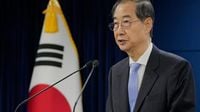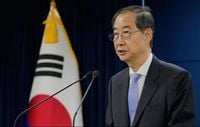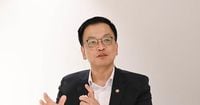In a dramatic escalation of global trade tensions, South Korea's Acting President Han Duck-soo has declared that the "global trade war has become a reality," urging the government to mobilize all resources to mitigate the fallout from new tariffs imposed by the United States. During a meeting with senior officials, Han emphasized the urgency of the situation, particularly for South Korean industries affected by the U.S. tariffs, which include the automotive sector.
On April 2, 2025, U.S. President Donald Trump announced reciprocal tariffs on over 180 countries, implementing a base tariff of 10% on most imports, with significantly higher rates for approximately 60 trading partners. South Korea faces a steep 25% tariff, while goods from China are subject to a 34% tariff, and those from the European Union (EU) face a 20% tariff. These tariffs are set to take effect on April 5 for the base rate and April 9 for the higher rates.
In response to this alarming development, Han Duck-soo has instructed Minister of Trade, Industry and Energy Ahn Duk-geun to analyze the implications of the new U.S. tariffs and actively negotiate with Washington to minimize their impact on Korean businesses. "The government must focus all resources to resolve this crisis," Han stated, underscoring the potential risks to South Korea's export-dependent economy.
Economic experts in Seoul are voicing serious concerns about the ramifications of Trump's tariff decision. Park Sang-hyun, an economist at iM Securities, remarked, "This is a major shock for the Korean economy," highlighting that key export items like automobiles will be heavily impacted. He noted that exports to the U.S. from South Korean production facilities in Vietnam will also suffer significantly due to an additional 46% tariff on imports from Vietnam, where major South Korean companies like Samsung Electronics and LG Electronics operate.
On April 3, the South Korean government convened an emergency meeting to address macroeconomic and financial issues, attended by Finance Minister Choi Sang-mok, Bank of Korea Governor Rhee Chang-yong, and leaders from the Financial Services Commission and Financial Supervisory Service. Minister Choi assured that the government would utilize all available tools to stabilize the market in the wake of the U.S. tariff announcement, committing to swift and appropriate support measures for affected industries.
Choi emphasized that the U.S. government's tariff measures could lead to increased volatility in the global financial markets, which in turn would likely affect South Korea's financial and foreign exchange markets. He stated, "We will mobilize all resources to minimize damage to the economy," and pledged to coordinate with the private sector through a strategic economic security task force to develop optimal response plans.
The immediate impact of the tariffs was felt on the Korean stock market, where the KOSPI index plummeted by 2.7%, reaching a three-month low. The automotive sector, in particular, experienced a significant downturn, with stocks hitting a 14-month low. Shares of chip manufacturers also fell sharply, with LG Energy Solution's stock reaching a record low.
Prior to the tariff announcement, South Korean officials had been actively seeking exemptions from the U.S., arguing that Seoul maintains nearly zero tariffs on U.S. goods under a comprehensive free trade agreement. However, these efforts were ultimately unsuccessful, leaving the country exposed to the adverse effects of the new tariffs.
The situation has also drawn reactions from the EU, which is facing its own set of tariffs. EU leaders expressed disappointment and vowed to retaliate against the U.S. measures. Irish Prime Minister Micheál Martin criticized the Trump administration's tariffs as "damaging to the world economy" and detrimental to transatlantic relations. Similarly, Swedish Prime Minister Ulf Kristersson stated that Trump's tariffs contradict the principles of free competition, while Italian Prime Minister Giorgia Meloni affirmed Italy's commitment to reaching an agreement with the U.S. to avoid a trade war that could weaken Western economies.
As the global trade landscape shifts dramatically, the South Korean government is preparing to take decisive action. Han Duck-soo is set to chair a meeting with the private sector on April 3, 2025, to discuss strategies to respond to the U.S. tariff policies. The stakes are high for South Korea, as the country grapples with the potential fallout from a trade war that could reshape its economic future.






